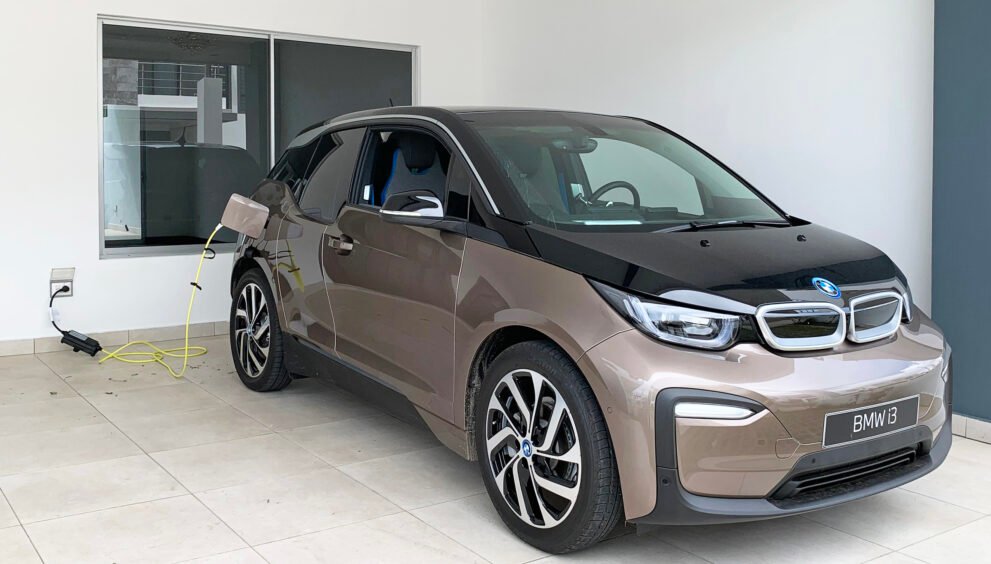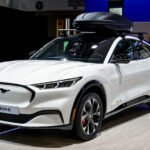Electric Car Brands in North America: Complete Guide to Automakers Leading the EV Revolution (2025)

As electric vehicles go mainstream, the number of electric car brands available in North America is growing fast. In 2025, drivers can choose from a wide range of automakers offering EVs in every category from economy hatchbacks to luxury sedans and high-performance trucks.
This guide breaks down all the major electric car brands in North America, including legacy manufacturers, exclusive EV makers, and new startups that are changing the future of driving.

Legacy Automakers Going Electric
These well-known brands are pivoting from gas engines to electric power—many committing to fully electric lineups by 2035.
🔹 Ford
- Top EVs: Mustang Mach-E, F-150 Lightning, E-Transit
- Made in: U.S. and Mexico
- EV Goal: All-electric lineup for passenger vehicles in North America by 2030
🔹 General Motors (GM)
- Top EVs: Chevy Bolt EUV, Blazer EV, Silverado EV, Cadillac LYRIQ
- Made in: Michigan, Tennessee, Ontario
- EV Platform: Ultium battery architecture across all brands
🔹 Hyundai / Kia
- Top EVs: Ioniq 5, Ioniq 6, EV6, EV9
- Known For: Ultra-fast charging, long warranties, stylish crossovers
🔹 Toyota / Lexus
- Top EVs: bZ4X, Lexus RZ 450e
- Focus: Hybrid dominance now transitioning to BEVs
- Coming Soon: Solid-state battery models
🔹 Volkswagen
- Top EVs: ID.4 (U.S.-built), ID. Buzz (coming soon)
- EV Goal: 55% of U.S. sales to be electric by 2030
These electric car brands are trusted household names—and now fully invested in clean transportation.
Exclusive EV Makers
These companies were built from the ground up to produce only electric vehicles.
🔹 Tesla
- Models: Model 3, Y, S, X, Cybertruck
- Production: Texas, California, Nevada, Mexico
- Known For: Longest range, self-driving tech, Supercharger network
🔹 Rivian
- Models: R1T, R1S
- Focus: Adventure vehicles, Amazon delivery vans
- Built in: Illinois
🔹 Lucid Motors
- Model: Lucid Air
- Segment: Ultra-luxury, high-range sedans
- Manufacturing: Arizona
These brands are pushing innovation in performance, design, and vertical integration—especially Tesla, which remains the dominant EV player in North America.

New EV Startups to Watch
The future of electric car brands in North America is also being shaped by startups and international entrants.
🔹 VinFast (Vietnam)
- Models: VF 8, VF 9
- North American Plant: Under construction in North Carolina
- Unique Offering: Battery subscription model
🔹 Fisker
- Model: Fisker Ocean
- Target: Affordable luxury, built in Austria
- Coming Soon: Fisker PEAR (under $30K)
🔹 Aptera
- Concept: Solar-powered 3-wheeler EV
- Range: Up to 1,000 miles
- Best For: Efficiency-first, sustainable buyers
🔹 Canoo
- Focus: Modular EVs for fleet and personal use
- Clients: U.S. military, Walmart
- Built in: Arkansas, Oklahoma
These electric car brands are carving out niches in affordability, design, and alternative ownership models.
Premium & Luxury Brands with EV Ambitions
High-end automakers are going all-in on EVs, often as part of their global sustainability plans.
🔹 BMW
- Models: i4, i7, iX
- Style: German performance with digital tech
- Plans: Half of sales electric by 2030
🔹 Mercedes-Benz
- Models: EQE, EQS, EQB
- Known For: Hyperscreen tech, ultra-quiet cabins
- North American Focus: Localized EQ production
🔹 Audi
- Models: Q4 e-tron, Q8 e-tron, e-tron GT
- EV Architecture: Shared platforms with Porsche and VW
These brands are competing with Tesla and Lucid for high-income EV buyers looking for luxury and innovation.
Canadian and Mexican EV Brands
🔹 ElectraMeccanica (Canada)
- Model: SOLO (1-seater commuter EV)
- Target: Urban drivers, fleet delivery
🔹 Zacua (Mexico)
- Focus: Local EV production for domestic market
- Models: Compact city cars
While smaller in scale, these electric car brands help build regional supply chains and offer alternatives for budget buyers.

Final Thoughts
The growing list of electric car brands in North America reflects just how fast the EV transition is happening. Whether you’re shopping for a compact commuter, a family SUV, or a luxury performance vehicle, there’s now an electric option for nearly every buyer.
As more startups launch, legacy brands pivot, and governments push for cleaner mobility, expect even more innovation in design, tech, and price. The EV future isn’t just coming—it’s being built right now.





























































































































































































